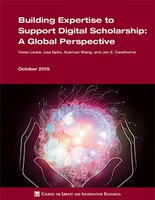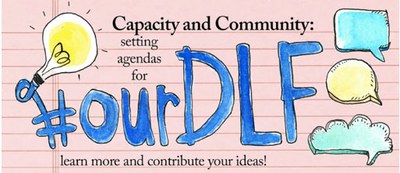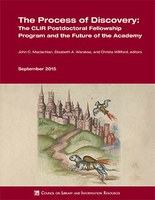
Number 107 • September/October 2015
ISSN 1944-7639 (online version)
Contents
Supporting Digital Scholarship: A Global Perspective
Call for Participation: Openlab Unconference and Ignite Talks
DLF Forum Update
CLIR to Serve as Administrative Host for IIIF Consortium
Join us for Webinar Oct. 21: Collaboration in the Evolving Academy
CLIR to Assess Impact of NDSR Programs
Digitization Cost Calculator: Call for Data
Briefly Noted: Leading Change Institute, Data Curation Hosts, DHSI discounts, and eResearch Preregistration
CLIR Issues is produced in electronic format only. To receive the newsletter electronically, please sign up at https://www.clir.org/pubs/issues/signup.html. Content is not copyrighted and can be freely distributed.
Supporting Digital Scholarship: A Global Perspective
What skills, competencies, knowledge, and mindsets should digital scholars possess? How are such attributes cultivated, and how does such expertise vary around the world? These are among the questions addressed in a new CLIR report, Building Expertise to Support Digital Scholarship: A Global Perspective.
 Authors Vivian Lewis, of McMaster University; Lisa Spiro, of Rice University; Xuemao Wang, of University of Cincinnati; and Jon E. Cawthorne, of West Virginia University visited digital scholarship organizations in eight countries to identify the workforce-related factors important to the success of digital scholarship and gain a more nuanced understanding of expertise in different cultural and national contexts. They focused on “best in class” digital scholarship organizations, highlighting the human dimensions behind their success in areas such as research output, grant funding, international reputation, and innovative teaching or training programs.
Authors Vivian Lewis, of McMaster University; Lisa Spiro, of Rice University; Xuemao Wang, of University of Cincinnati; and Jon E. Cawthorne, of West Virginia University visited digital scholarship organizations in eight countries to identify the workforce-related factors important to the success of digital scholarship and gain a more nuanced understanding of expertise in different cultural and national contexts. They focused on “best in class” digital scholarship organizations, highlighting the human dimensions behind their success in areas such as research output, grant funding, international reputation, and innovative teaching or training programs.
The team conducted site visits and interviews of practicing digital scholars at 16 digital scholarship organizations in Canada, China, Germany, India, Mexico, Taiwan, and the United Kingdom, as well as the United States. While most of the interviews focused on digital humanities, the team also included several organizations that emphasize digital social science research to identify both commonalities and differences.
“As we visited DSOs around the world, we noted a pattern,” note the authors. “What sets apart leading organizations is the leader’s vision; the curiosity, expertise, and collegiality of faculty, students, and staff; and the vibrancy of the community . . . the key is people.”
The report includes sections on skills, competencies, and mindsets important to digital scholarship; how these qualities are developed; characteristics of organizations that enable continuous learning; digital scholarship expertise in a global context; and challenges facing digital scholarship organizations.
The authors conclude with a series of recommendations aimed at digital scholars, leaders of digital scholarship organizations, universities and host organizations, funders, and the broader digital scholarship community.
The report is available as a PDF download free of charge at https://www.clir.org/pubs/reports/pub168.
Call for Participation: Openlab Unconference and Ignite Talks
We invite you to join us at the Openlab Unconference and Ignite Talks on the afternoon of December 1, 2015, in Crystal City, Virginia (just outside Washington, DC). The Ignite Talks and Unconference will be the signature event of the Openlab Workshop, and will provide a crucial forum for sharing the opinions, insights, and perspectives that will define the goals and challenges of the Openlab initiative.
Proposals are now being accepted for Ignite Talks (energetic, 5-minute presentations designed to maximize the sharing of ideas); the proposal deadline is October 31. The Unconference and Ignite Talks are free and open to all, but registration is required.
Openlab is envisioned as a solutions lab, convener, and consultancy designed to accelerate the speed and impact of transformational change in the GLAM (gallery, library, archive, and museum) sector. It is founded on the premise that GLAMs are critical institutions to the humanities and vital stewards of the cultural heritage materials used by researchers, teachers, students, and the broader American public. Technology has provided GLAMs new ways to engage with audiences and increase the scale and impact of their work, but not all GLAMs are well-equipped with the resources or expertise to best leverage digital technologies. The Openlab concept is envisioned as a public solutions lab and consultancy designed to address these challenges. Once established, Openlab seeks to accelerate the spread of digital technologies in GLAMs by positioning itself as a hub for the field that supports institutions big and small. Openlab Workshop facilitator and CLIR Distinguished Presidential Fellow Michael Peter Edson explains the Openlab concept in the brief video above.
The Openlab Workshop is a collaborative effort between the National Endowment for the Humanities and the Council on Library and Information Resources (CLIR), with co-conveners the American Alliance of Museums /Center for the Future of Museums, the American Library Association /Center for the Future of Libraries, the Digital Public Library of America, the Digital Library Federation, and the Metropolitan New York Library Council. Read more at https://www.clir.org/about/news/pressrelease/openlab.
DLF Forum Update
The DLF Forum in Vancouver grows ever nearer, and we are happily entrenched in preparations for a lively convening of members of the digital library community. At time of writing, we expect to welcome nearly 500 participants to the Forum itself, as well as over one hundred attendees to affiliated events, including the inaugural DLF Liberal Arts Colleges Preconference: a full day of programming by and for DLF’s growing liberal arts college membership.
This year marks the Forum’s first meeting in Canada, and indeed outside the United States at all, and we are grateful for the support of our local host and sponsors. Thanks to the generosity of the UBC Library, DLF is offering streaming and recording of select sessions from the Forum. We will share the link for the streaming channel in advance.
 Dr. Safiya Noble, Assistant Professor in the Department of Education and Information Studies at the University of California, Los Angeles, will deliver an opening Keynote Address titled “Power, Privilege, and the Imperative to Act,” on LIS activist work in a digital paradigm.
Dr. Safiya Noble, Assistant Professor in the Department of Education and Information Studies at the University of California, Los Angeles, will deliver an opening Keynote Address titled “Power, Privilege, and the Imperative to Act,” on LIS activist work in a digital paradigm.
The interactive closing session, Capacity and Community: Setting Agendas for DLF, will bring together cross-sections of DLF interests, communities, and perspectives, for an animated work session to set future agendas for the DLF. We invite you to share your ideas and visions under the hashtag #ourDLF.
Stay tuned at https://www.diglib.org/category/forum/ and the #DLFforum hashtag on Twitter and for news and updates before, during, and after the forum! As a reminder, we will be in Milwaukee, Wisconsin, for next year’s forum, Nov. 7-9, 2016.
CLIR to Serve as Administrative Host for IIIF Consortium
CLIR has agreed to serve as administrative host to the International Image Interoperability Framework Consortium (IIIF-C). Formed in June 2015, the consortium aims to standardize and improve sharing and display of image-based scholarly resources on the web.
Founding members of the consortium are the British Library, Oxford University, Stanford University, Bayerisches Staatsbibliothek (Bavarian State Library), Bibliothèque nationale de France (National Library of France), Cornell University, Nasjonalbibliotek (National Library of Norway), Princeton University, Wellcome Trust, and Yale University.
Access to image-based resources is fundamental to research, scholarship, and the transmission of cultural knowledge. Digital images are a container for much of the content in the Web-based delivery of images, books, newspapers, manuscripts, maps, scrolls, single sheet collections, and archival materials. Yet much of the Internet’s image-based resources are locked up in silos, with access restricted to custom-built applications.
IIIF-C aims to reduce the inefficiency and redundancy that result from incompatibility in how images are delivered, and to collaboratively produce an interoperable technology and community framework for image delivery. The framework includes two application programming interfaces (APIs). The Image API provides access to the image content and technical descriptions. The Preservation API gives structural and descriptive information about the image’s context so that it can be appropriately rendered for a web-based viewing environment.
“The International Image Interoperability Framework Consortium is pleased to have the support of the Council on Library and Information Resources as the administrative host for our organization, because of the obvious synergies between the new consortium and long-running community-based programs of CLIR,” said Stanford University Librarian Michael Keller. “As the IIIF-C expands its membership and grows the range of scholarly functions supported, we rely fully on CLIR and its reach to so many related communities of practice and interest to assist us.”
While the IIIF originated in libraries, the community is rapidly expanding to include museums, archives, and image services of all types, creating new opportunities for exchange and collaboration across sectors, and a discussion list has been started for institutions and individuals interested in adopting the IIIF, developing software to support it, or giving feedback on the effort.
Join us for Webinar Oct. 21: Collaboration in the Evolving Academy
What do we need to collaborate successfully on team-based projects? Four former CLIR postdoctoral fellows will draw on their personal experiences to explore the opportunities and challenges of working in groups to achieve shared goals, including strategies for grant applications and management, collaborative digital projects, and coauthored publications. The presenters—Tamsyn Rose-Steel of Johns Hopkins University, Inna Kouper of Indiana University Bloomington, Jennifer Parrott of Clayton State University, and Katie Rawson of the University of Pennsylvania—are coauthors of an essay on collaboration in the recently published volume, The Process of Discovery: The CLIR Postdoctoral Fellowship Program and the Future of the Academy. A question-and-answer period will follow the presentations.
The webinar will take place Wednesday, October 21, 2015 at 12:00 noon Eastern time, in the Adobe Connect meeting room http://clir.adobeconnect.com/clir/. There is no cost for the webinar, and registration is not required. The classroom will open at 11:45 am Eastern time. The webinar will be recorded and archived, and will be accessible at https://www.clir.org/about/news/collabacademy.
CLIR to Assess Impact of NDSR Programs
CLIR has received funding from the Institute for Museum and Library Services (IMLS) to assess the impact of five National Digital Stewardship Residency (NDSR) programs.
IMLS and Library of Congress created NDSR in 2012 to help build capacity in the information services and cultural heritage professions for the collection, management, preservation, and distribution of digital assets to the American public.
The NDSR programs enable recent graduates of master’s and doctoral programs in library and information sciences and related fields to acquire hands-on knowledge and skills relating to the collection, selection, management, long‐term preservation, and accessibility of digital assets. NDSR residents complete an intensive digital stewardship immersion workshop before undertaking digital stewardship projects at select host institutions.
Since 2013, IMLS has funded a series of five programs to engage residents at institutions in Washington DC, Boston, New York City, and other sites across the United States. By the summer of 2016, 35 recent graduates will have completed working residencies at leading U.S. institutions in the field of digital stewardship.
In the coming year, a research team including former CLIR postdoctoral fellow Meridith Beck Sayre and former NDSR resident Samantha DeWitt will gather data through interviews, site visits, and a survey. This data will help the team evaluate the significance of the residency experience for the residents and their host institutions. They will identify the differences among the five programs and the perceived effects of those differences on the residents, and articulate the factors common to successful and productive residencies. In late 2016, the team will produce a report with recommendations for future initiatives that build on the work of the residents and their mentors. CLIR will publish the team’s report at the end of the project.
Questions about the assessment may be directed to Christa Williford at cwilliford@clir.org.
Digitization Cost Calculator: Call for Data
The cost assessment subcommittee of DLF’s Digital Library Assessment Interest Group is developing a tool for the broader CLIR community: the digitization cost calculator, which can help libraries create rough estimates of time and cost for digitization projects.
The group is now calling for institutions to contribute data to power the calculator. All data submitted will be made publicly available; contributions can be made here: https://duke.qualtrics.com/jfe/form/SV_3OtqSEAbpl2QDl3.
Since a beta version of the calculator was released last year, the group has redesigned the interface and, with input from the community, developed two other resources: a set of definitions of digital project processes and a bibliography on cost assessment and digitization workflow best practices for digital libraries.
Working groups make the DLF community an effective agent of change and help our members get things done. We invite you to learn more about the Assessment Interest Group and DLF’s working groups, what they’re up to, and how to get involved. If you are interested in starting a new group, let us know.
Briefly Noted
Apply now for Leading Change Institute; announcing new CLIR sponsors scholarship award
CLIR and EDUCAUSE are now accepting applications for the 2016 Leading Change Institute, June 12-17, 2016, in Washington, DC. Applications are due by 5 pm Eastern time on Friday, December 4. This year, CLIR will award one scholarship to an applicant from a CLIR sponsor institution selected to attend the Institute. All applicants from CLIR sponsor institutions will be automatically eligible for consideration for this scholarship; selection will be made by senior staff at CLIR based on the overall strength of the individual’s application as part of the larger review process. The recipient must be a staff member at a CLIR sponsor institution at both the time of award and for the duration of the 2016 LCI.
Wanted: Hosts for Fellows in Data Curation for the Sciences and Social Sciences
CLIR is still seeking hosts for Fellowships in Data Curation for the Sciences and Social Sciences. The two-year fellowships will begin between July and September 2016. Host institutions benefit from the expertise of science and social science PhDs interested in working in data curation and software curation. CLIR offers funding for educational benefits for the fellows, as well as partial salary support for selected fellows in software curation. Read more.
Attention DLF members: Register for Digital Humanities Summer Institute at reduced rate
Individuals affiliated with Digital Library Federation (DLF) member institutions are eligible to register for digital humanities training and enrichment courses offered by the Digital Humanities Summer Institute (DHSI) in Victoria, B.C., at a deeply reduced rate. DHSI will offer 43 courses and 10 short workshops in the summer of 2016. Register on the DHSI site, and see DLF discount code at bottom of page. DLF will also provide free tutition to five DLF-DHSI Cross-Pollinator Fellows in 2016; information will be posted at www.diglib.org in November.
Pre-registration open for DLF eResearch Network
The DLF eResearch Network is a cohort-based learning experience, focused on implementing research data management services and engaging in shared skill development, networking, and collaboration. The goal is to foster a self-reliant, mutually supportive community of practice, engaged in continuous learning about RDM, data curation, and e-research support. The program will run from May–November 2016. Faculty and other details will be determined; early registration is encouraged so that we can recruit speakers and customize the curriculum to suit the new cohort’s interests and goals.
New for 2016:
- DLF member institutions who wish to participate in the eRN will receive significant discount. (Tuition for an institutional team of three will total $1,000 for DLF members and $3,000 for non-member institutions.)
- Participation will be easier and less expensive, because the in-person meet-ups that bookend the program will be optional.
- The humanities data curation content of the program will be increased.
Sign your team up for 2016: http://diglib.org/eRN-signup/
Learn more about the eRN: http://www.diglib.org/groups/e-research-network/

